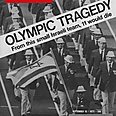
Israel marks 40th anniversary of Munich massacre in London
In shadow of Olympic Committee's refusal to hold moment of silence for 11 slain athletes during opening ceremony, Israelis hold modest ceremony, lay wreaths and read prayers
Complaining that the Olympic movement is still ignoring their pain, Israelis marked the 40th anniversary of the Munich massacre on Sunday with a modest service in the atrium of a London apartment block.
Prayers were read for the 11 murdered Israelis, wreaths were laid for them and a plaque unveiled about four miles (six kilometers) from the Olympic Stadium.
However, there will be no minute of silence for them at Friday's opening ceremony.
Related stories:
- Ambassador to skip unveiling of memorial to Munich victims
- Obama supports Olympic moment of silence
- Report: Israel fears 'anniversary attack' at Olympics
"The International Olympic Committee have a moral commitment to commemorate the 11 athletes, coaches and referees," Israeli Olympic Committee secretary general Efraim Zinger said. "Not because they were Israelis, but because they were Olympians and were murdered during the Olympic Games.
"It's been 40 years since that dreadful day and I hope that the day will come that the IOC will recognize all 11 athletes as victims and find the proper way to commemorate their memory."
IOC President Jacques Rogge reiterated Saturday that the opening ceremony was not an appropriate arena to remember the dead despite pressure from politicians in the United States, Israel and Germany.
In talks over several years with Israeli officials, the IOC has not been able to agree to a suitable way of remembering the slain athletes at each game, according to Zinger.
"The frustrating fact is that until now, none of the alternative ways to commemorate was practiced," Zinger said.
Rogge does plan to honor the dead at a reception in London during the games on Aug. 6. IOC officials will also attend a ceremony in Germany on the anniversary of the attack on Sept. 5 at the military airfield of Furstenfeldbruck, where most of the Israelis died.
Massacre 'trivialized'
The tranquility of the Munich Games was shattered in the second week when eight members of the Black September militant group penetrated the laxly secured Olympic Village and took Israeli team members hostage. A day later, all 11 were dead.
Ben Helfgott, who was at the 1972 Olympics, said at Sunday's commemorations that the memorial service immediately after the massacre was "trivialized" because the murders of the competitors was equated with the deaths of the terrorists.
In front of a tightly packed audience featuring a relative of one victim, London Mayor Boris Johnson recalled watching the events unfold as an 8-year-old child in England.
"What sticks in my mind is that sense of sacrilege and a feeling of horror that the world's greatest sporting event should suffer such an attack, and that an attack should be mounted against people who had been training for what should have been the greatest event in their lives," Johnson said. "And I think the world watched with a sense of numb disbelief as those events unfolded because sport should transcend politics.
"It should bring out the best in the human race. It should draw people together in admiration for achievement and for effort. And yet some people chose to profane that great celebration and to cut short the lives of 11 innocent (people)."
Johnson said he hoped the Olympics, which run until Aug. 12, are only remembered for sporting endeavors and that athletes of all faiths are able to "unite in a city that unites the world."
But the games are starting against a backdrop of security fears surrounding the Israeli delegation, featuring 38 athletes.
Israel is on the alert for plots targeting its citizens overseas after five Israelis vacationing in Bulgaria were killed in a suicide bombing last week, Israeli Prime Minister Benjamin Netanyahu said on Sunday.
"Unfortunately we are part of a very distinguished list of countries" whose teams are susceptible to attack, Zinger said. "We have to live with it."










